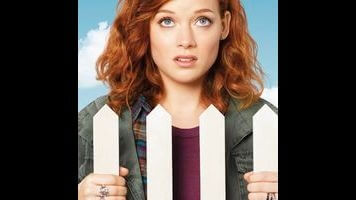After 20 minutes spent stewing in anticipation, with every emotional beat slightly and deliberately off-key, "The Wishbone" builds to a finale that knocked me out. Once again, Suburgatory shows just how much depth is in the cartoon. “The Wishbone” isn’t even that cartoonish in plot, but it sure makes up for that in style. Director Uta Briesewitz, D.P. for The Wire, shoots with such tight focus that Chatswin keeps blurring into one colorful, plastic mosaic, like a continuous background to the animated cel-actors. The one poster in Tessa’s room is required by dialogue, and it just happens to complement Alex’s wardrobe. And maybe it’s because I’m from the South, but the autumn leaves look faker than the smiles. Chatswin looks even more artificial than usual, but that’s the point.
Lisa Shay is just this side of strangling cats to feel alive for a moment, which is to say she is almost pure cartoon. She exists to be reliably strange, and even her strangeness, how she is strange, is unusual for television. But because she provides so many good laughs, whether I see her as fully human or not, she encourages identification, or at least sympathy. She’s not the emotional center—she’s not even an emotional center—but I like her. And then a comic subplot goes too far, and she shows just how seriously she feels aggrieved by her mother.
I’m reminded of “The Motherload.” That episode tries and fails to keep its defenses up, and at the last moment, Tessa seriously faces up to a deep wound. Lisa does the same in “The Wishbone,” which not for nothing opens with Tessa and Lisa in a position that will soon take on some significance, lying on the ground next to each other. Lisa’s entire year-and-a-quarter story has been a preposterous war against her mother. Last Thanksgiving, as Fred cheerfully reminds us, Lisa even showed up to her dinner naked, anything to keep from donning her mother’s colonial-wear. By the end of the season, Lisa is so sure she’s not related to her mother that she assumes she’s been adopted and discovers the wonders of confirmation bias. It’s easy to take for pure comic relief. But now Lisa sees her mother seeing Malik naked, and she can’t take it. She tries to get through dinner, but everyone keeps talking about it and joking about it, and she explodes. This hasn’t been comic relief for her, and she’s not just a cartoon. Suburgatory is her life.
Both Sheila and Alex are known for deliberately mistreating their daughters, but in “The Wishbone,” their crimes are completely accidental. Well, not completely. Alex is a total mess, somehow misreading her fax about Thanksgiving and showing up in Chatswin instead of New York. As George says, that irresponsibility is a personal problem, and it affects other people. It is not cosmic misfortune. (True, when you get down to it, Sheila barging in on Malik showering mere minutes after he tells her that’s where he’ll be is pretty thoughtless, too. Parallels all over the place!) When Alex fake-snores as Tessa opens up, it’s the saddest joke in the series because it’s so plausible. That joke even interrupts a train of thought that they never return to, not the brightest omen for their continuing relationship.
Because it’s an episode about Tessa preparing to meet Alex, “The Wishbone” spends most of its time in this weird, suspended emotional space. I want Tessa to meet her mother, but I don’t want Alex to hurt her, but I don’t want Tessa to hurt George, and I don’t want him to get upset, and I really wouldn’t mind a good George-Dallas scene for the first time since they’ve been dating, and is it too much to ask for some Ryan Shay? Since this is a titanic deal for Tessa, Jane Levy fights the comedy, which augments the weird emotional stew, and no other plots seem to be going anywhere. The Shays are doing their usual high-strung preparations, George’s cooking is awful, Dallas and Dalia show up with a rack of backless outfits. Noah reveals he’s completely alone for the holiday, not in a pitying way, but it hardly eases the tension. Mr. Wolfe and Chef Alan show up and explain that they’ve been exiled from their own homes for being gay, and that’s not helping. The longer Alex stays away, the longer I’m in this anxious place (although, c’mon, I’ve seen the promos; where is she?). It’s really effective.
And then comes the release. Lisa walks away from Malik, and he shouts some serious truth. “You want me to hate your mom? Sorry, I don’t.” In a way, I don’t think I had ever really considered Malik’s feelings toward Sheila as separate from Lisa’s. It truly catches me off-guard that he might sincerely like Sheila. “So I guess we’re breaking up?” he shouts at Lisa’s back. We see her shut the door, then dolly in on Malik, standing there alone in the dark.
Somewhere in there Alexi Murdoch’s “Orange Sky” starts playing, and suddenly I’m thinking about Seth and Summer and Sandy and Kirsten. This montage doesn’t just build power across scenes but across shows! Murdoch songs feature prominently in both Thanksgiving episodes of The O.C., and “Orange Sky,” in particular, lays over the denouement of the Cohens’ first Thanksgiving. Their feast goes awry and they don’t all get along, but they split off into small groups and dine on take-out Chinese, although Seth winds up alone, the one tinge of unresolved angst to a subdued, barely successful neighborhood get-together. Whether Lisa makes up with him or not, poor Malik has a sad night.
As for Lisa, watching her crumple against the bathroom door is a heartbreaker, made urgent thanks to an unsteady camera. Then she spots an envelope taped to the mirror. It’s the wishbone. (Best episode title since Homeland’s “The Smile.”) Ryan Shay, who is desperate to get the wishbone from the Shay turkey this year because he wants to sleep with Tessa, gives that wish—well, not that wish—to Lisa instead. Like Uncle Noah consoling Dalia in “Down Time,” also written by Brian Chamberlayne, it’s a selfless act from someone who’s basically a caricature. And it’s all the more meaningful because Ryan Shay is a cartoon.
Meanwhile, Tessa talks with Alex, lying on the bedroom floor at an odd angle. George sits outside at the top of the stairs to make sure everything goes okay; he’s not optimistic. When Tessa first arrives home and goes off to her room, the responses from the adults are telling. Alex immediately says she’ll go home. George says he’ll call her a cab. And only Dallas recognizes—or is willing to accept—that this is a pivotal moment for Tessa. Things go well enough with Alex, and she even sleeps over. But it’s nice to be reminded that when the disappointment comes—and television just loves a flaky bio-mom—there’s another mother in town to help pick up the slack.
Stray observations:
- Lisa had big plans for Tessa meeting her mom. “It’s too bad we didn’t have more of a head’s up. Could have made a great human interest piece. Could have reached out to Connie Chung, Hugh Downs. God, I wish Donahue was still in the game. He would have handled this right.”
- Is it me, or does Malin Akerman fit right in? I admit I'm in the tank for Childrens Hospital, but the scene in the kitchen with Alex, George, and Dallas doesn’t feel like a guest star has showed up for an episode. It feels like everyday Chatswin.
- When Sheila asks, “How those veggies coming, Denzel?” Fred answers. “I’m grating cheese, actually.”
- Later, Sheila tries to be less comforting to Malik at the behest of her daughter. “Honestly, Malik, I don’t give a rat’s ass what you wear to the table. That better?” So many great performances in this episode, but Ana Gasteyer's comic relief should not be overlooked.
- Is this a totally new take on the seeing-somebody-naked trope? Among the many sentences of consolation that pass between Sheila and Malik, my favorite was Sheila saying, “I once worked as a counselor at a summer camp where I had to perform biweekly tick checks, and I can assure you, I was quite thorough.”
- Dallas is still using the wrong terms to describe her business. “In fact, for as long as I’ve been dealing, none of my employees have ever pushed the amount of crystal rock she has.”
- I would pay to hear Dalia describe things. “Tessa’s very much like a man. She dresses like a man, but she’s smaller than a man. She’s like a man trapped in a small boy’s body. There he is now.”









































